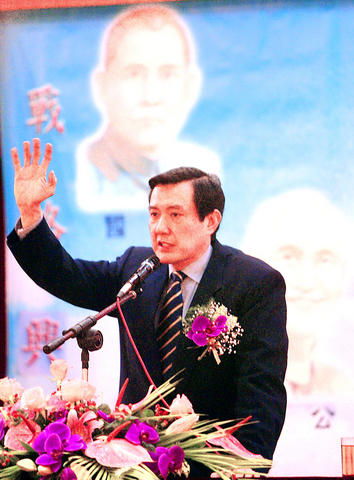The deadlock in cross-strait relations can be solved if Taiwan abides by the "1992 Consensus," Chinese Nationalist Party (KMT) presidential hopeful Ma Ying-jeou (
Ma also restated his proposal that Taiwan and China sign a truce and said he would work toward that goal if elected.
The nation should only sign such a truce if China removes all missiles targeted at Taiwan, Ma said in a speech at the Society of Strategic Studies in Taipei yesterday.

PHOTO: CNA
Ma told the audience that China posed a threat, but was also a door to new opportunities, and said it was therefore crucial for Taiwan to find a balance between the two.
"With more than 1,000 missiles aimed at Taiwan and warplanes along the coast, China is certainly a threat ... on the other hand, it also provides us with unlimited opportunities," Ma said.
China's growing economy represents unlimited opportunities to Taiwan, he said, adding that in the last year, business transactions between Taiwan and China amounted to a total of US$100 billion.
"We have to minimize threats and maximize opportunities, which cannot be achieved through conflict" he said.
The first step in avoiding conflicts, Ma said, was to recognize the "1992 Consensus."
"We have to actively work to improve our relationship with China ... and our future negotiations with China. We cannot break the 1992 Consensus," Ma said.
The KMT says that, at landmark talks held between Taipei and Beijing in Hong Kong in 1992 -- when the KMT was in power -- the two sides agreed to respect each other's interpretations of the "one China" principle.
This agreement has been termed the "1992 consensus" by the party.
However, Beijing says that Taiwan and China both agreed to adhere to the "one China" principle in 1992 and insists that Taiwan accept the principle as a condition for resuming cross-strait talks.
The Democratic Progressive Party insists that the "1992 consensus" does not exist.
February last year, KMT Legislator Su Chi (蘇起), then Mainland Affairs Council chairman, admitted that he created the term in 2000, shortly before President Chen Shui-bian (陳水扁) was inaugurated, with the aim of giving the two sides of the Taiwan Strait a "basis for dialogue."
Ma yesterday said that Taiwan's recognition of the "1992 Consensus" would increase regional stability and encourage business developments.
"Under the concept [of the 1992 Consensus] ... the two sides can sign a truce valid for decades at the least, so that Taiwan and China can continue to increase relations in peace," he said.
On the issue of the economy, Ma said he wanted to pursue a laissez-faire policy to increase cross-strait exchanges in trade, tourism, and investments, until "both sides eventually comprise a common market."
Additional reporting by CNA

US President Donald Trump said "it’s up to" Chinese President Xi Jinping (習近平) what China does on Taiwan, but that he would be "very unhappy" with a change in the "status quo," the New York Times said in an interview published yesterday. Xi "considers it to be a part of China, and that’s up to him what he’s going to be doing," Trump told the newspaper on Wednesday. "But I’ve expressed to him that I would be very unhappy if he did that, and I don’t think he’ll do that," he added. "I hope he doesn’t do that." Trump made the comments in

Japanese footwear brand Onitsuka Tiger today issued a public apology and said it has suspended an employee amid allegations that the staff member discriminated against a Vietnamese customer at its Taipei 101 store. Posting on the social media platform Threads yesterday, a user said that an employee at the store said that “those shoes are very expensive” when her friend, who is a migrant worker from Vietnam, asked for assistance. The employee then ignored her until she asked again, to which she replied: "We don't have a size 37." The post had amassed nearly 26,000 likes and 916 comments as of this

Tourism in Kenting fell to a historic low for the second consecutive year last year, impacting hotels and other local businesses that rely on a steady stream of domestic tourists, the latest data showed. A total of 2.139 million tourists visited Kenting last year, down slightly from 2.14 million in 2024, the data showed. The number of tourists who visited the national park on the Hengchun Peninsula peaked in 2015 at 8.37 million people. That number has been below 2.2 million for two years, although there was a spike in October last year due to multiple long weekends. The occupancy rate for hotels

A cold surge advisory was today issued for 18 cities and counties across Taiwan, with temperatures of below 10°C forecast during the day and into tonight, the Central Weather Administration (CWA) said. New Taipei City, Taipei, Taoyuan and Hsinchu, Miaoli and Yilan counties are expected to experience sustained temperatures of 10°C or lower, the CWA said. Temperatures are likely to temporarily drop below 10°C in most other areas, except Taitung, Pingtung, Penghu and Lienchiang (Matsu) counties, CWA data showed. The cold weather is being caused by a strong continental cold air mass, combined with radiative cooling, a process in which heat escapes from